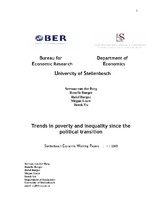Trends in poverty and inequality since the political transition
Abstract
Using a constructed data series and another data series based on the All Media and Products surveys (AMPS), this paper explores trends in poverty and income distribution over the post-transition period. To steer clear of an unduly optimistic conclusion, assumptions are chosen that would tend to show the least decline in poverty. Whilst there were no strong trends in poverty for the period 1995 to 2000, both data series show a considerable decline in poverty after 2000, particularly in the period 2002-2004. Poverty dominance testing shows that this decline is independent of the poverty line chosen or whether the poverty headcount, the poverty ratio or the poverty severity ratio are used as measure. We find likely explanations for this strong and robust decline in poverty in the massive expansion of the social grant system as well as possibly in improved job creation in recent years. Whilst the collective income of the poor (using our definition of poverty) was only R27 billion in 2000, the grants (in constant 2000 Rand values) have expanded by R22 billion since. Even if the grants were not well targeted at the poor (and in the past they have been), a large proportion of this spending must have reached the poor, thus leaving little doubt that poverty must have declined substantially.

